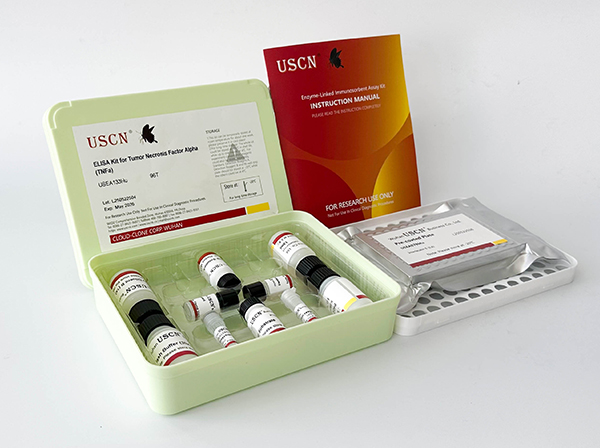ELISA Kit for Tumor Necrosis Factor Receptor 1 (TNFR1)
CD120A; P55; TNFRSF1A; TBP1; FPF; TNF-R; TNF-R-I; TNF-R55; TNFAR; TNFR55; TNFR60; P55-R; P60; Tumor necrosis factor receptor 1; Tumor necrosis factor-binding protein 1
- Product No.USEB499Hu
- Organism SpeciesHomo sapiens (Human) Same name, Different species.
- Test MethodDouble-antibody Sandwich
- Assay Length3h
- Detection Range15.6-1,000pg/mL
- SensitivityThe minimum detectable dose of this kit is typically less than 6.5pg/mL.
- Sample Typeserum, plasma, urine, cell lysates and other biological fluids
- Download Instruction Manual
- UOM 48T96T 96T*5 96T*10 96T*100
-
FOB
US$ 164
For more details, please contact local distributors!US$ 234
For more details, please contact local distributors! US$ 1053
For more details, please contact local distributors! US$ 1989
For more details, please contact local distributors! US$ 16380
For more details, please contact local distributors!
Specificity of the ELISA Kit for Tumor Necrosis Factor Receptor 1 (TNFR1)
This assay has high sensitivity and excellent specificity for detection of Tumor Necrosis Factor Receptor 1 (TNFR1).
No significant cross-reactivity or interference between Tumor Necrosis Factor Receptor 1 (TNFR1) and analogues was observed.
Recovery of the ELISA Kit for Tumor Necrosis Factor Receptor 1 (TNFR1)
Matrices listed below were spiked with certain level of recombinant Tumor Necrosis Factor Receptor 1 (TNFR1) and the recovery rates were calculated by comparing the measured value to the expected amount of Tumor Necrosis Factor Receptor 1 (TNFR1) in samples.
| Matrix | Recovery range (%) | Average(%) |
| serum(n=5) | 96-104 | 101 |
| EDTA plasma(n=5) | 91-98 | 95 |
| heparin plasma(n=5) | 78-89 | 80 |
Precision of the ELISA Kit for Tumor Necrosis Factor Receptor 1 (TNFR1)
Intra-assay Precision (Precision within an assay): 3 samples with low, middle and high level Tumor Necrosis Factor Receptor 1 (TNFR1) were tested 20 times on one plate, respectively.
Inter-assay Precision (Precision between assays): 3 samples with low, middle and high level Tumor Necrosis Factor Receptor 1 (TNFR1) were tested on 3 different plates, 8 replicates in each plate.
CV(%) = SD/meanX100
Intra-Assay: CV<10%
Inter-Assay: CV<12%
Linearity of the ELISA Kit for Tumor Necrosis Factor Receptor 1 (TNFR1)
The linearity of the kit was assayed by testing samples spiked with appropriate concentration of Tumor Necrosis Factor Receptor 1 (TNFR1) and their serial dilutions. The results were demonstrated by the percentage of calculated concentration to the expected.
| Sample | 1:2 | 1:4 | 1:8 | 1:16 |
| serum(n=5) | 96-103% | 82-90% | 91-105% | 98-105% |
| EDTA plasma(n=5) | 79-104% | 91-99% | 82-97% | 84-102% |
| heparin plasma(n=5) | 94-103% | 94-105% | 79-91% | 78-103% |
Stability of the ELISA Kit for Tumor Necrosis Factor Receptor 1 (TNFR1)
The stability of kit is determined by the loss rate of activity. The loss rate of this kit is less than 5% within the expiration date under appropriate storage condition.
To minimize extra influence on the performance, operation procedures and lab conditions, especially room temperature, air humidity, incubator temperature should be strictly controlled. It is also strongly suggested that the whole assay is performed by the same operator from the beginning to the end.
Assay procedure summary of the ELISA Kit for Tumor Necrosis Factor Receptor 1 (TNFR1)
1. Prepare all reagents, samples and standards;
2. Add 100µL standard or sample to each well. Incubate 1 hours at 37°C;
3. Aspirate and add 100µL prepared Detection Reagent A. Incubate 1 hour at 37°C;
4. Aspirate and wash 3 times;
5. Add 100µL prepared Detection Reagent B. Incubate 30 minutes at 37°C;
6. Aspirate and wash 5 times;
7. Add 90µL Substrate Solution. Incubate 10-20 minutes at 37°C;
8. Add 50µL Stop Solution. Read at 450nm immediately.
Test principle of the ELISA Kit for Tumor Necrosis Factor Receptor 1 (TNFR1)
The test principle applied in this kit is Sandwich enzyme immunoassay. The microtiter plate provided in this kit has been pre-coated with an antibody specific to Tumor Necrosis Factor Receptor 1 (TNFR1). Standards or samples are then added to the appropriate microtiter plate wells with a biotin-conjugated antibody specific to Tumor Necrosis Factor Receptor 1 (TNFR1). Next, Avidin conjugated to Horseradish Peroxidase (HRP) is added to each microplate well and incubated. After TMB substrate solution is added, only those wells that contain Tumor Necrosis Factor Receptor 1 (TNFR1), biotin-conjugated antibody and enzyme-conjugated Avidin will exhibit a change in color. The enzyme-substrate reaction is terminated by the addition of sulphuric acid solution and the color change is measured spectrophotometrically at a wavelength of 450nm ± 10nm. The concentration of Tumor Necrosis Factor Receptor 1 (TNFR1) in the samples is then determined by comparing the O.D. of the samples to the standard curve.
GIVEAWAYS
INCREMENT SERVICES
Single-component Reagents of Assay Kit
Lysis Buffer Specific for ELISA / CLIA
Quality Control of Kit
ELISA Kit Customized Service
Disease Model Customized Service
Serums Customized Service
TGFB1 Activation Reagent
Real Time PCR Experimental Service
Streptavidin
Fast blue Protein Stain solution
Single-component Reagents of FLIA Kit
Streptavidin-Agarose Beads



